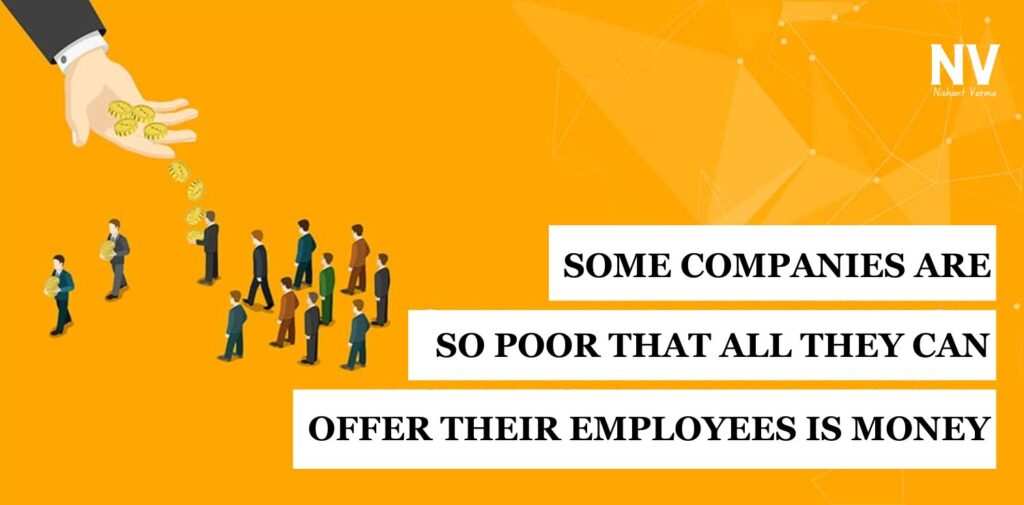In a world driven by capitalism and the quest for financial growth, many companies have built their entire value systems around monetary compensation. Yet, an emerging narrative has questioned whether financial incentives alone are enough to retain employees, foster innovation, and create a thriving workplace culture. “Some companies are so poor that all they can offer their employees is money” – a thought-provoking statement – invites us to explore the deeper, non-material wealth that organizations can, and should, provide their workforce.
In the current corporate landscape, more than ever, employees seek purpose, recognition, and growth beyond just a paycheck. As we delve into this topic, we’ll examine why companies that rely solely on money to attract and retain talent are missing out on creating a truly rich environment for their employees.
Monetary Compensation vs. True Wealth in the Workplace
Money is, without a doubt, a critical aspect of employment. It provides employees with the means to support themselves and their families, pursue personal goals, and enjoy a certain standard of living. However, the idea that money alone defines an employee’s satisfaction and fulfillment is a narrow perspective. Research has shown that factors such as job satisfaction, work-life balance, career growth, company culture, and purpose are equally, if not more, important.
Companies that rely solely on financial incentives without addressing these other aspects are akin to businesses that are, in essence, “poor.” They may have the financial capacity to pay hefty salaries, but they lack the richness in other areas that truly matter.

Why Money Isn’t Everything
- Employee Well-being and Mental Health: Offering high salaries is not a guarantee that employees will be satisfied or loyal. In fact, excessive reliance on financial rewards can sometimes mask deeper organizational issues such as toxic workplace environments, unrealistic expectations, or poor leadership. While a competitive salary might attract employees initially, it cannot compensate for burnout, lack of support, or unmanageable workloads. Over time, employees may prioritize mental health and well-being over financial rewards, leading to high turnover rates in companies that focus on money alone.
- Lack of Purpose and Meaning: In today’s world, more employees, particularly millennials and Gen Z, are looking for jobs that provide meaning and purpose. They want to work for companies that align with their values, where their contributions make a difference. This is one of the reasons why mission-driven organizations tend to attract passionate and dedicated employees. Companies that focus solely on financial rewards often fail to connect with their employees’ deeper sense of purpose, leaving them feeling unfulfilled despite the paycheck.
For example, an employee at a high-paying job might start to feel disillusioned if the company lacks a clear vision or is solely profit-driven without considering social or environmental impact. In contrast, working for a company that prioritizes sustainability, social responsibility, or community engagement can provide employees with a sense of pride and motivation beyond monetary compensation.
- Stunted Professional Growth: Employees are not just seeking a job but a career. Career development, learning opportunities, and skill-building are essential for professional satisfaction. Companies that prioritize short-term financial rewards but fail to invest in their employees’ long-term growth end up creating a workforce that feels stagnant and undervalued. The richest organizations are those that invest in their employees’ professional development through training programs, mentoring, and opportunities for advancement. Companies offering money but no growth prospects leave employees feeling like their careers are at a standstill. Over time, this can lead to disengagement and frustration. Employees might be tempted to leave for an organization that offers less pay but better opportunities for growth.
- Toxic Company Culture: One of the most significant contributors to employee dissatisfaction is a toxic company culture. No amount of money can compensate for an environment where employees feel undervalued, disrespected, or unsafe. In fact, some of the wealthiest companies in terms of monetary compensation have some of the poorest workplace cultures, leading to disengaged employees, high turnover rates, and even public scandals. A strong company culture is one where employees feel a sense of belonging, mutual respect, and trust. It’s about creating an environment where collaboration is encouraged, ideas are valued, and leadership is supportive. Companies with poor cultures, despite offering high salaries, struggle to keep employees who prioritize healthy working environments over money.

The True Wealth of a Company: Intangible Assets
The true wealth of a company lies in the intangible assets it provides to its employees, such as:
- Meaningful Work: Employees want to feel that their work matters, both within the organization and in the world at large. Companies that provide a sense of purpose and make their employees feel like their work has a positive impact create a rich environment that money alone cannot buy.
- Recognition and Appreciation: Recognition goes a long way in motivating employees. Feeling appreciated for their efforts fosters loyalty and satisfaction. A simple “thank you” or public acknowledgment of a job well done can have a more lasting impact on employee morale than financial bonuses.
- Flexibility and Work-Life Balance: Modern employees prioritize flexibility, remote work options, and a balance between professional and personal life. Companies that offer flexible schedules and prioritize work-life balance create happier and more productive teams. Money alone cannot buy time, and employees will always value the freedom to manage their time over an increment in their paychecks.
- Community and Belonging: A company that fosters a sense of community among its employees creates a rich workplace environment. Encouraging collaboration, teamwork, and a supportive atmosphere where employees can connect on a personal level contributes to a sense of belonging and satisfaction.
- Autonomy and Trust: Employees thrive in environments where they feel trusted to make decisions and have control over their work. Micromanagement, on the other hand, stifles creativity and motivation. When companies empower employees to take ownership of their projects and trust them to deliver results, they cultivate a sense of autonomy that is invaluable.
- Personal Fulfillment: Beyond financial incentives, employees seek personal fulfillment through their work. This fulfillment comes from pursuing passions, engaging in creative problem-solving, and contributing to something larger than oneself. Companies that encourage employees to follow their passions and provide platforms for creativity tend to retain more engaged and fulfilled workers.
Case Studies: Companies Offering More Than Just Money
- Google: Known for its unique workplace culture, Google goes beyond high salaries to offer employees unparalleled perks, from on-site wellness services to continuous learning opportunities. Employees have the flexibility to work on passion projects, which has led to some of the company’s most innovative products. The result is a loyal, motivated workforce that values the company’s culture as much as its paycheck.
- Patagonia: As a company committed to environmental responsibility, Patagonia attracts employees who are passionate about sustainability. Its employees are not just motivated by their salaries but by the opportunity to contribute to a company with a strong purpose. Patagonia also provides its employees with paid time off to volunteer for environmental causes, emphasizing personal fulfillment over financial incentives.

Conclusion: The Richness of Non-Monetary Value
In conclusion, while money is undoubtedly a vital component of employment, it is far from the only factor that determines employee satisfaction, loyalty, and engagement. Companies that focus solely on financial incentives often fail to provide the non-monetary value that employees crave – purpose, recognition, growth, flexibility, and a positive work environment. These intangible assets represent the true wealth of a company, far beyond its monetary resources.
The richest companies are those that offer more than just money. They offer a culture where employees feel valued, empowered, and fulfilled. In a world where corporate environments are evolving rapidly, companies that fail to recognize this are the ones truly impoverished – for they are missing out on creating an environment that fosters long-term loyalty, creativity, and success.




